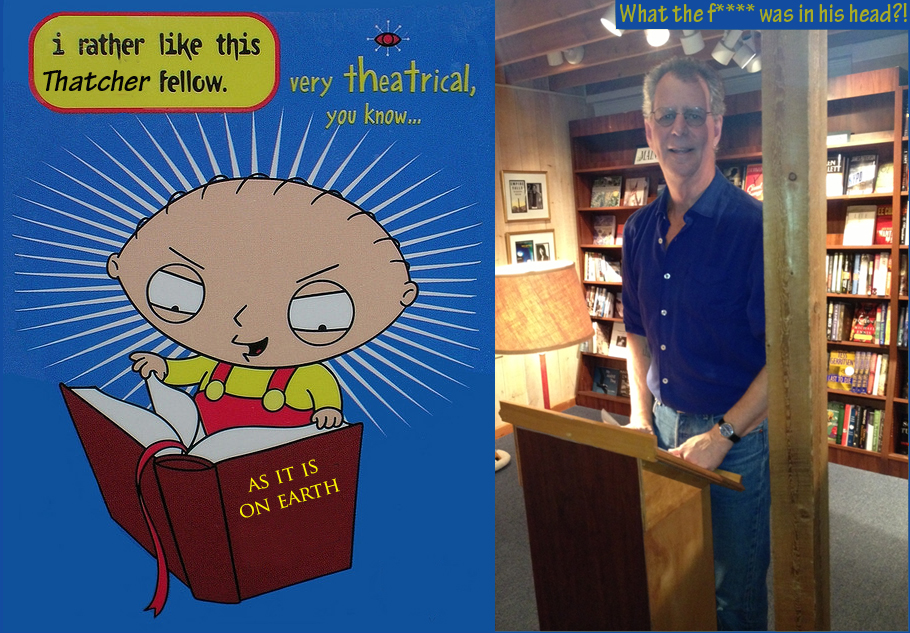A while back, I did a reading from As It Is On Earth in Maine. The following week, I read at Canio’s Books in Sag Harbor, Long Island.
Here’s a question: How does one read a story that is narrated in the first person? I mean, when the words you’re reading are being delivered in a ‘first-person’ voice. There’s usually no problem if someone tosses you a copy of, say…Walker Percy’s Lancelot. You didn’t write it. Read on, give the narrating protagonist whatever voice you want, so long as its southern…its a win win. You and the audience are in it together, chuckling away with schadenfreude…wink wink,…O, those nuthouse ramblings of that lovable cuckold Lancelot Lamar.
But, when it is you who wrote the ‘voice’ and the words that the protagonist-narrator speaks, well…the ‘I’ in the book becomes – like it or not – co-extensive with the ‘I’ who reads; that is, the words and thoughts appear to be Taylor Thatcher’s, but in truth they’re issuing from a single head – yours.
Is his voice, then, yours? I mean your timbre and intonations,…the seemingly clear and natural sounds that typically usher from your mellifluous voice box, the very ones that when played back on the family video make your sphincter cork screw. “Har har har,” you say, bobbing your head charmingly to the side as if dumping marbles from your ears, “That’s not really me, is it? Har!”
Or, do you put on a voice from Maine, and risk lapsing into one of the characters from The Family Guy because, let’s face it, Seth MacFarlane owns you. Stewie goes DownEast. “…ooooooooo, Brian, yaw jest anol’ rubba boot!”
Either way, you better take a stand, quick, before your nerves put a death grip on your voice box and you start off sounding like a canada goose.
Fortunately, my years of experience as a professor have tuned my voice to proper pitch, cadence, and inflection so that I can now pretty much fool anybody when I talk….or, at least hold their attention for a bit. Not only do profs know (like Taylor Thatcher) how to talk while thinking of what to say, but we can put a nice-sounding ring to it. Or so I thought, until my actor daughter Josephine, after one of my readings, suggested I was not quite the silver-tongued devil that I thought I was.
She pointed out that while Valley Girls and young American teens everywhere (…and even a few grad students that I know) lilt upwards with their voice at the end of their sentences, in typical conversation most of the rest of us lilt upwards at the clauses within sentences. Listen in closely during your next conversation…it seems to be true,…call it the melody of discourse. Any half-decent actor knows this, she assures me.
Now, everyone knows that when you’re telling someone something we end on a down note…”He’s kind of a bore, isn’t he.”…but re-frame it querulously, and we conclude in the upper register: “He’s kind of a bore,…isn’t he?” But she was suggesting something more…go back to the moment when the voice was first heard, the moment when the conversational melody was conjured in the writing. Made sense to me.
I gave it my best shot in Maine; it needs work (Thomas Wolfe – the other one – might be right…”you can’t go home again”). I’ll try again this Saturday in Long Island, but I confess I feel a bit exposed. It’s bad enough that the audience knows that I once wrote these words (…Sheeesh, what the f*** was going on inside this guy’s head!). My instinct is to distance myself from Taylor’s voice however best I can, and follow the lead of the mexican telephone operator from Chiapas at the end of Chapter 1:
It was only when I answered my office phone and heard the operator’s voice, far away, as if coming from deep in the back of my desk drawer – “Señor Thatcher, por favor?” – then, I knew where Nicole had gone.









It’s funny that you should mention this. I’m reading the whole thing in the voice of Peter M. Wheelwright to the extent that I’m thinking stuff like ‘Boy, I never knew Peter’s family was Calvinist’. To me, Taylor Thatcher is PMW, I can’t help it. Makes the sex scenes pretty icky, obviously. Probably just happens to those who know you, though I’ll bet it happens to all of us.